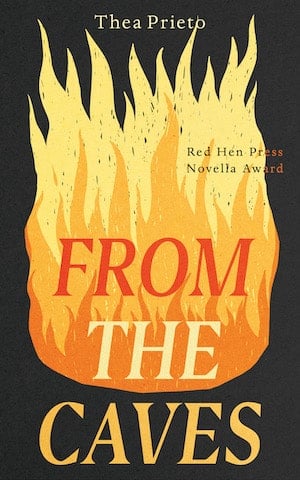The end of the world is not for the faint of heart, and neither is Thea Prieto’s bold and beautiful novella about four humans pushed to the limits of climate catastrophe. Echoing the style of myths and examining the power of storytelling, From the Caves is about Sky, a young man coming of age and learning how to take responsibility for himself and his community.

Sky’s community is a small but strong one. Living in caves alongside the “Enemy Ocean,” the people in Sky’s life are his older brother Mark, who struggles with anger about the past; Teller, the group’s storytelling elder who is dying from an infection; and Tie, a pregnant woman in mourning. As the four companions approach the inevitable intensities of both death and birth, they also carry immense grief for lost loved ones and the fierce willpower needed to keep themselves and each other alive.
The characters and the world they live in are pushed to their limits in every way. Sky and his companions live in a time of extreme heat and dangerously little water. Their environment is described as so hot it feels barely livable. The nights “burn,” the ground is “cooked,” skin thickens “to rubber,” and feet “blister” against the hot floors of the caves. Their severely limited water supply heightens the stakes even more. “You’ll kill us wasting water,” one character admonishes. When Sky accidentally spills water, his punishment is that his water allotment be withheld. Prieto captures Sky’s intense thirst:
As Tie tips the jar toward her sunburnt lips, grains of sand move in the charcoal-clouded fluid, and Sky can almost feel the quick liquid soaking his own tongue, rolling down his own throat.
Prieto’s prose is both entrancingly poetic and painfully direct. Defamiliarization is abundant—because nothing in this story’s setting is familiar—which leads to affecting descriptions even in small moments, such as “her eyes are like holes poked in sand.” The absence of quotation marks emphasizes the storytelling theme, as the reader experiences dialogue in the same way one hears an oral story—in one voice:
What are those? interrupts Sky.
Don’t you know what writing is, says Mark.
Sky ducks his face.
What’s it mean?
Mark tilts his head to the side, itches his scalp.
I know what these mean.
As this excerpt demonstrates, not only is the writing style shaped by a profound care for words, but the story itself reflects on the vitality of words. Words are images (on the cave walls, Sky studies the “tightly gathered and overlapping markings”), sounds (Teller “fills the cave ceiling with pulsing words”), and ideas (Sky wishes for “words that are lovely and lasting”). And the environment itself has a language:
At the far end of the tunnel, the sunlight is a crooked triangle of waving heat, blurs of gray sand and orange light, and the rippling writes a brief and silent language in the air that does not comfort Sky.
Another salient theme of the novella is motherhood. While our environment is often described with maternal language (i.e. “Mother Nature”), Prieto’s exploration of motherhood is unique and fresh. Sky grieves the loss of his mother as Tie prepares to become one. Tie’s pain in this situation is difficult for other characters to bear. In one scene, she says: “I don’t want a baby, I don’t want to be special.” Her relationship with motherhood, particularly in the extremely challenging world she lives in, is nuanced and complicated. Through Tie’s experience as a pregnant person, Prieto captures the raw physicality of motherhood—ultimately, motherhood is a body that gives.
From the Caves is a tale about myths and the role of story, but it’s not necessarily a cautionary one—only because “caution” is an irrelevant concept for these characters living in a world of consequences. Instead, the reader is fully immersed in the reality of life at the end of the world. It’s easy to interpret the setting as the dark result of our current times—the sea consists of “brown waves, the floating, gritty plastic” and holds “the torn shell of a single skyscraper and a lone section of a bridge”—however, death is also presented as the necessary loss that ushers in the emptiness from which life must be birthed. The novella lives in this dark space between ending and beginning. As each character grapples with tension over their own survival—with a baby coming and a man dying—their storytelling connects them to each other, to their past, and to their future.
Layered with profound reflections, honest questions and heartfelt moments—particularly around motherhood and the fabric of our environment that connects us all—From the Caves is a powerful novella that is undaunted in its pursuit of meaning in darkness. Its haunting poetry is sure to leave its own memorable imprint on any reader searching for the connection that only words can bring.
Lillie Gardner is a writer based in St. Paul, Minnesota. Her work has been published in Quail Bell Magazine, Delmarva Review, Long River Review and more. She’s also an essays reader for Hippocampus Magazine and a contributor at Feminist Book Club.

